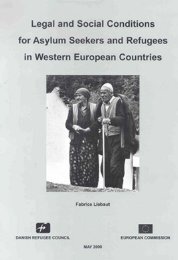I External aid
I External aid
I External aid
Create successful ePaper yourself
Turn your PDF publications into a flip-book with our unique Google optimized e-Paper software.
Horizontal Issues<br />
20<br />
Future generations<br />
deserve to live in a<br />
better world<br />
© Santiago Herrero Villa<br />
ANNUAL REPORT ON THE IMPLEMENTATION OF THE EUROPEAN COMMISSION’S EXTERNAL ASSISTANCE<br />
1 EUROPEAN INITIATIVE<br />
FOR DEMOCRACY AND<br />
HUMAN RIGHTS<br />
Founded on the principles of freedom,<br />
democracy and the respect of Human<br />
Rights, the European Union is defending<br />
these principles – protecting Human<br />
Rights, consolidating democracy and the<br />
rule of law, as well as fighting poverty –<br />
the promotion and protection of which<br />
are among its fundamental objectives. (11)<br />
Beyond the Community’s foreign <strong>aid</strong> programmes<br />
and the resources of the European<br />
Development Fund, the European<br />
Initiative for Democracy and Human<br />
Rights (EIDHR) offers the Union a legal<br />
framework and significant resources<br />
to provide targeted <strong>aid</strong> and to act in situ,<br />
on its own initiative and without prior<br />
agreement.<br />
What is the European Initiative for Democracy<br />
and Human Rights? The EIDHR<br />
serves to bolster the EU’s other actions in<br />
the field of human rights and democratisation. Compared<br />
with other Community instruments (EDF, Tacis, ALA, MEDA,<br />
CARDS, Phare), it:<br />
◗ is complementary to these programmes which are undertaken<br />
with governments in that it can be implemented with<br />
various partners, in particular NGOs and international organisations;<br />
◗ represents a type of “venture capital fund” for Human<br />
Rights, allowing initiatives to be launched at a pilot or<br />
experimental level, which can then be picked up by governments<br />
on a larger scale;<br />
◗ can be used without host government consent or where<br />
mainline Community programmes are not available;<br />
◗ constitutes an essential complement to the EU’s foreign<br />
policy and common security objectives in the fields of<br />
human rights, democratisation and conflict prevention. (12)<br />
In certain regions it represents the sole legal basis for certain<br />
activities (political and civil rights protection, election<br />
monitoring, conflict resolution initiatives, etc.).<br />
For its beneficiaries, EIDHR provides an added value which<br />
sets it apart from other donors. Because it is identified with<br />
the European Union, it is seen as reflecting and promoting<br />
the EU’s democratic values. In this way, the EIDHR is considered<br />
to emanate from Europe as a whole, rather than from<br />
specific interests or traditions.<br />
Because it enjoys the political support of the EU, EIDHR subsidies<br />
can, in certain cases, help protect vulnerable civil<br />
society organisations.<br />
Because the EU is an organisation committed to regional<br />
integration and given the existence of agreements between<br />
the Union and regional groupings, the EIDHR can also facilitate<br />
the adoption of Human Rights and democratisation initiatives<br />
on a regional basis.<br />
With the exception of Turkey, the candidate countries are not<br />
eligible for the EIDHR.<br />
THREE EXPRESSIONS OF THE UNION’S<br />
HUMAN RIGHTS POLICY<br />
- The European Community’s foreign <strong>aid</strong> programmes<br />
attack the root causes of poverty.<br />
- The European Development Fund (EDF) covers Africa, the<br />
Caribbean and the Pacific Region. €182 million have<br />
been spent on direct support for Human Rights and democratisation<br />
between 1997 and 2000, and €115 million<br />
on election assistance and monitoring between 1996 and<br />
1999. (The total EDF budget amounts to €13.5 billion<br />
between 2000 and 2007.)<br />
- The European Initiative for Democracy and Human Rights<br />
has permitted a considerable improvement in the EU’s<br />
commitment. The amounts devoted to Human Rights have<br />
increased from €200,000 in 1987 to €100 million at the<br />
end of 2000. In addition, since 1999, the Union has a<br />
significant legal framework for promoting human rights in<br />
its external policy. (13) The EIDHR enables the Community,<br />
in particular, to support the activities of non-governmental<br />
and international organisations (such as the United<br />
Nations High Commission for Human Rights) as well as<br />
regional organisations (Council of Europe, OSCE, etc.).<br />
(11) See the Communication from the Commission to the Council to the European Parliament of 8 May 2001 on the European Union’s role in promoting human rights and democratisation in third<br />
countries (COM(2001)252 final).<br />
(12) Communication of 11 April 2001 on conflict prevention (COM(2001) 211).<br />
(13) Council Regulations 975 and 976/1999 of 29 April 1999 – OJL 120 of 8 May 1999.

















